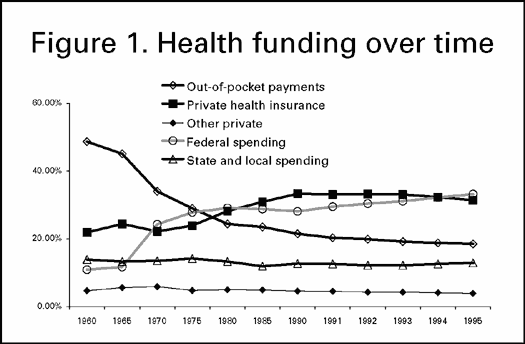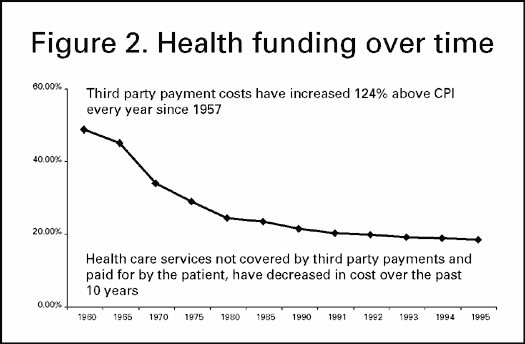
Health Care Inflation - The worst
thing we could do to Medicare is to add a pharmacy benefit.
By David J. Gibson, MD
There is a coming cultural war that will make all past encounters (e.g.,
abortion, privacy, gay rights, the war in Viet Nam, the future role of the
United Nations, etc.) seem like minor skirmishes.
This is reality: Social Security and Medicare will consume an ever-increasing
portion of workers' incomes as the government seeks to keep its promises to
future retirees, according to the 2003 annual reports for Social Security and
Medicare. Social Security and Medicare Part A (Hospital Insurance) are funded by
a 15.3 percent payroll tax. Currently, the two programs together consume 13.4
percent of taxable payroll. So with a ratio of three workers for each retiree,
they run a small surplus each year. However, according to the Trustees'
"intermediate" forecast:
When today's college students reach retirement age in 2050, workers will face a payroll tax rate of 17.3 percent just to pay Social Security benefits - a 40 percent increase.
When Medicare Part A is included, the payroll tax burden will have to rise to 24.4 percent -- almost a fourth of all the wages workers will earn that year.
Medicare Part B (Supplemental Medical Insurance) and other federal health programs are paid by general revenues. However, they can also be expressed as a percentage of taxable payrolls:
Adding the government's share of Medicare Part B, the burden on workers will climb to 29.2 percent by 2050.
Adding other elderly health care expenses, such as Medicaid and veterans' benefits, the total burden will reach 33.6 percent by mid-century.
To cover these increasing costs, the federal government could dip into general income tax revenues. By 2030, about the midpoint of the baby boomer retirement years, the two programs will need about 36.5 percent of all federal income taxes to pay full benefits. By 2050, Social Security and Medicare will require more than half of federal income tax revenue - 54.2 percent - in addition to payroll taxes.
I recently attended a dinner party with people from my generation, the boomers, and current college students. During dinner I remarked that federal and state entitlements were simply not sustainable.
I asked the students whether their generation was willing to pay the taxes necessary to transfer wealth to the boomers in coming years. The answer was a unanimous and emphatic no (which ruined the meal for the boomers).
Who can blame the young people? Resisting tax increases is part of America's genetic code. Our slow burn in California over property taxes culminated in passage of Proposition 13. The anger helped lead to the Reagan Revolution.
There is a tipping point at which taxes become so onerous that the individuals and businesses either leave or topple the government at the ballot box. To a person, the college students indicated that entitlements would not be permitted to impoverish their generation.
Today's inordinately expensive health care is the primary inflationary driver for entitlements. People are especially generous when spending someone else's money. Today, someone else, either government or private insurers, directly pays over three-quarters of medical expenses.
This year, the jump in health-care costs was seven times the rate of inflation Health care is now the leading cause of entitlement inflation. Why does it cost so much here in the United States? Why do we spend more of our national treasure to purchase health care goods and services than any other industrialized country?
Not only is Medicare - the backbone of guaranteed medical care for 40 million older Americans - in deep trouble, but today's beneficiaries spend a higher percentage of their annual income on medical care than before Medicare started 30 years ago. What happened?
Health care cost inflation is also affecting the under 65 working population. Employers spend roughly $10,000 to $13,000 for an employee with family coverage. Last year, we spent $5,035 per person on hospitals, nursing homes, doctors, dentists and drugs, and an additional $665 on insurance bureaucracies, public health, academic research and construction. The total tab rose to $1.42 trillion - bigger than the entire economy of our favorite ally, France.
The cost for major medical coverage has increased 124 percent above the consumer price index (CPI) every year since 1957. Why does health care levitate above the laws that affect all of the rest of our economy?
Figure 1 begins to demonstrate why health care behaves differently and why cost trends have been so anomalous. In 1960, most funding for health care goods and services came from the patient - In fact, almost 60 percent of all payments were made out-of-pocket by patients. Patient contributions have steadily declined to less than 20 percent; while employer and federal entitlement payments have risen from a combined 30 percent in 1960 to over 80 percent in 1995.

The health care market, which was inflating at roughly the level of the CPI
before 1960, began to diverge from the economy's general performance and started
its 125 percent of CPI trajectory. Health care lost the discipline that
consumers impose on the economy. Health care began pricing its goods and
services based on the deepest pockets in the market, the employer and
the government. The end result has been the pricing of health care well beyond
the individual consumer's capacity to pay.
Figure 2 takes this same data and examines the behavior of health care prices in the third-party payment and the consumer payment markets.Government with all its price controls and the insurance companies with all their negotiated discounts have proven to be incompetent purchasers of health care services.

The third-party payment market has been the exclusive cost driver for health
care inflation. The services paid for by the consumer that are not covered under
the typical major medical policy have actually decreased in price, when adjusted
for inflation, during the past 40 years.
Prior to the late 1980s, pharmacy was a non-covered benefit. Pharmaceutical products inflated at or below the CPI. Once they were covered, costs began inflating at an annual 20 percent compounded rate and have become, with hospital services, the leading driver of health care inflation.
We have iatrogenically
created the near perfect inflation machine within our economy. Both the consumer
of health care services and the generators of goods and services have been
shielded from the negative economic consequences of their decisions. We have
lost any incentive to increase productivity, improve quality or control cost.
Ours is the only industry
without such innovative options as SouthWest Airlines, Costco or Priceline.com -
all delivering higher quality service at lower cost.
Unless we re-establish the disciplinary function of the at-risk consumer, there is not enough money in all Christendom to pay for the rapacious inflationary trend we have unleashed.
What passes for public policy decision making these days involves debates over how to pay for inflationary increases in entitlement programs. It is incredible that the debate now commanding the most attention is establishing a new pharmacy benefit for Medicare. Creating a pharmacy benefit would exacerbate the problem of health care cost; and, as history repeats itself, would only increase the cost for health care borne by the elderly beneficiary.
Our health care system suffers from having too much money rather than not enough. Until health care is forced to price its services at a level that patients can actually afford - rather than levels the government and employers can pay - the system will continue to inflate faster than the rest of the economy.
Let's face it: our industry is becoming an over-funded economic hot house mutant.
Unless we relish a bitter
war with our children, we had better fix this problem